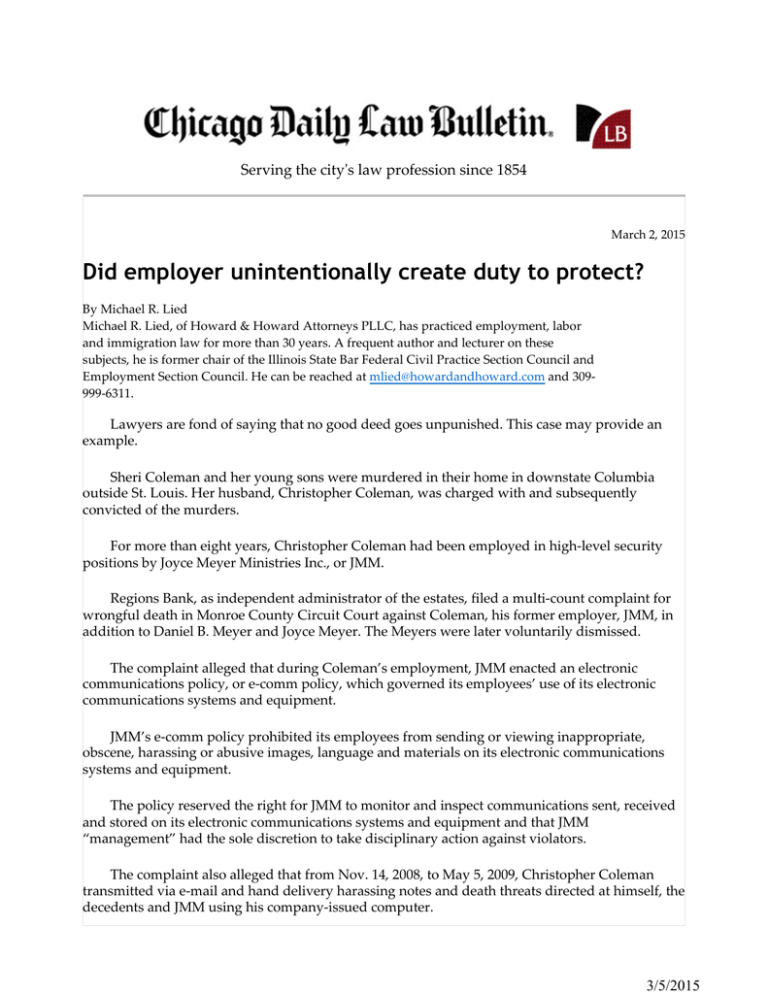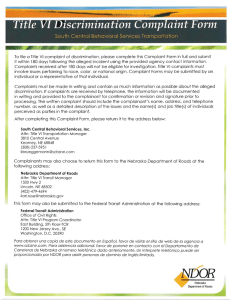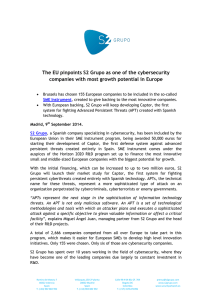Did employer unintentionally create duty to protect?
Anuncio

Serving the cityʹs law profession since 1854 March 2, 2015 Did employer unintentionally create duty to protect? By Michael R. Lied Michael R. Lied, of Howard & Howard Attorneys PLLC, has practiced employment, labor and immigration law for more than 30 years. A frequent author and lecturer on these subjects, he is former chair of the Illinois State Bar Federal Civil Practice Section Council and Employment Section Council. He can be reached at [email protected] and 309­ 999­6311. Lawyers are fond of saying that no good deed goes unpunished. This case may provide an example. Sheri Coleman and her young sons were murdered in their home in downstate Columbia outside St. Louis. Her husband, Christopher Coleman, was charged with and subsequently convicted of the murders. For more than eight years, Christopher Coleman had been employed in high­level security positions by Joyce Meyer Ministries Inc., or JMM. Regions Bank, as independent administrator of the estates, filed a multi­count complaint for wrongful death in Monroe County Circuit Court against Coleman, his former employer, JMM, in addition to Daniel B. Meyer and Joyce Meyer. The Meyers were later voluntarily dismissed. The complaint alleged that during Coleman’s employment, JMM enacted an electronic communications policy, or e­comm policy, which governed its employees’ use of its electronic communications systems and equipment. JMM’s e­comm policy prohibited its employees from sending or viewing inappropriate, obscene, harassing or abusive images, language and materials on its electronic communications systems and equipment. The policy reserved the right for JMM to monitor and inspect communications sent, received and stored on its electronic communications systems and equipment and that JMM “management” had the sole discretion to take disciplinary action against violators. The complaint also alleged that from Nov. 14, 2008, to May 5, 2009, Christopher Coleman transmitted via e­mail and hand delivery harassing notes and death threats directed at himself, the decedents and JMM using his company­issued computer. 3/5/2015 It alleged that prior to May 5, 2009, JMM was aware that death threats had been made against Christopher Coleman and the decedents and that the death threats had been delivered to the Colemans’ home and through Christopher Coleman’s e­mail account. JMM argued that Count 3 of the complaint should be dismissed because it did not allege sufficient facts to establish that JMM took appropriate actions to protect the decedents from the harmful acts of a third party. The trial court granted JMM’s motion. On appeal, Regions Bank contended that the trial court erred in dismissing its claims against JMM. The 5th District Appellate Court first considered whether the factual allegations in Count 3 were sufficient to establish that JMM voluntarily undertook to protect the decedents from Coleman’s criminal acts. Ordinarily, a person has no affirmative duty to protect another from harmful or criminal acts by a third person. Some exceptions to this general principle have been recognized, including when there is negligence in the performance of a voluntary undertaking. In Illinois, this exception has been narrowly construed, and the duty imposed is limited by the extent of the undertaking. A plaintiff may allege either nonfeasance or misfeasance in the performance of a voluntary undertaking. According to the appellate court, it is not necessary that a defendant must have foreseen the precise nature of the harm or the exact manner of occurrence; it is sufficient if, at the time of the defendant’s action or inaction, some harm could have been reasonably foreseen. Here, the threats of harm were specific and targeted against the decedents. Given the gravity of the threats, it was objectively reasonable to anticipate that some harm might come to them. There were adequate factual allegations in the complaint to establish that JMM was aware that specific death threats had been made against the decedents using JMM e­mail communications, and that JMM voluntarily undertook an effort to investigate those threats and to protect the decedents from the threatened harm. Count 3 also adequately alleged that JMM’s negligent performance of its voluntary undertaking increased the risk of harm to the decedents. A jury could infer that JMM increased the risk of harm to the decedents by failing to conduct an adequate investigation of its own communications systems and equipment, essentially electing to remain ignorant of facts concerning the source of the threats. This at a time when a reasonable person might have conducted an internal investigation of its systems and equipment. It might also be reasonable to infer that Sheri Coleman did not have an equal and independent means to investigate the threats and that, in relying on JMM’s promises to investigate the threats and to provide security, she did not take steps to protect herself and her children from the threatened harm. 3/5/2015 Accordingly, Count 3 contained sufficient allegations of fact to state a cause of action for wrongful death based on a voluntary undertaking theory. As a result, the complaint should not have been dismissed. It remains to be seen if the plaintiff can actually prove that JMM undertook to protect the Coleman family. However, the case provides a cautionary tale for employers with regard to employees who act in a threatening manner — even to family members. The case is Regions Bank v. Joyce Meyer Ministries Inc., 2014 IL App (5th) 130193 ©2015 by Law Bulletin Publishing Company. Content on this site is protected by the copyright laws of the United States. The copyright laws prohibit any copying, redistributing, or retransmitting of any copyright­ protected material. The content is NOT WARRANTED as to quality, accuracy or completeness, but is believed to be accurate at the time of compilation. Websites for other organizations are referenced at this site; however, the Law Bulletin does not endorse or imply endorsement as to the content of these websites. By using this site you agree to the Terms, Conditions and Disclaimer. Law Bulletin Publishing Company values its customers and has a Privacy Policy for users of this website. 3/5/2015





